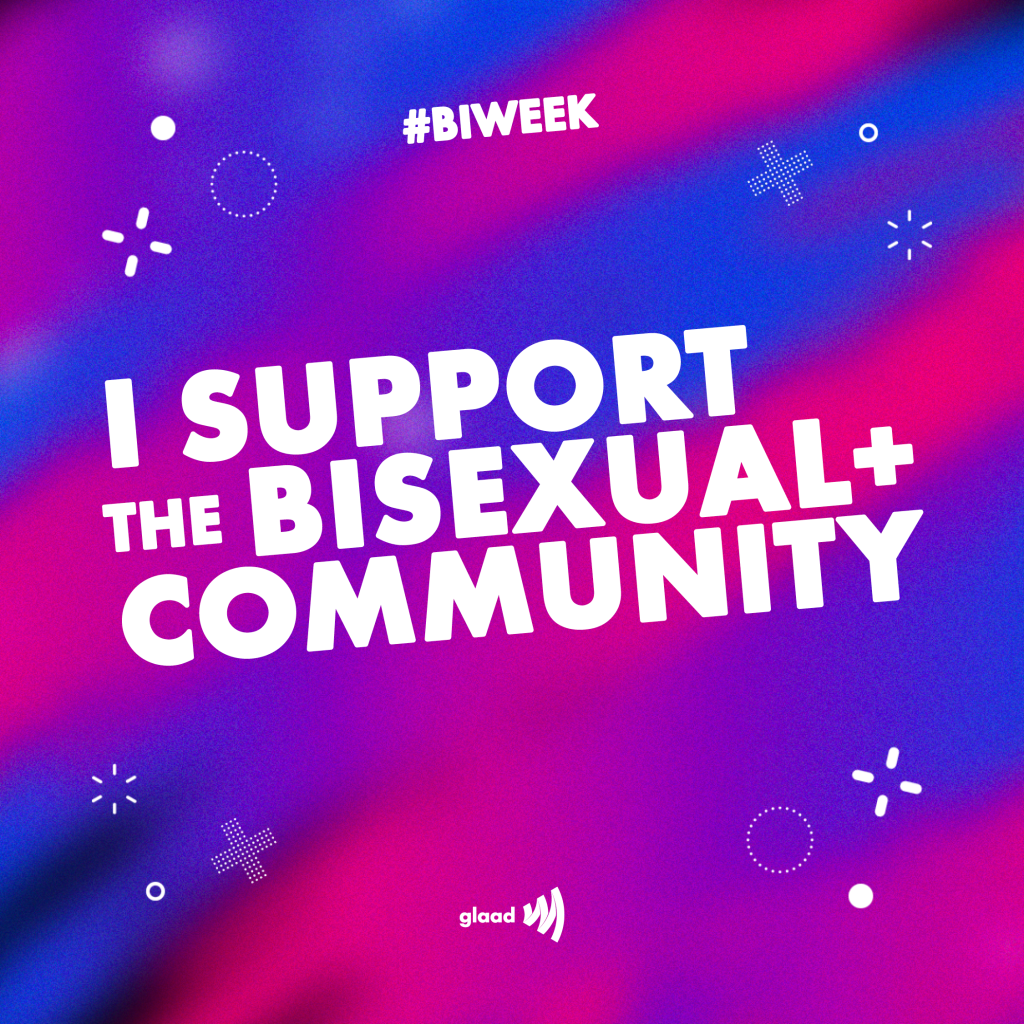Claiming the term “ally” for yourself is a strange thing. It sometimes feels hollow to me, like when men will say “I’m a nice guy” to me, but not really mean it. In my mind, anyone who feels the need to exclaim to the world that they behave a certain way are often too busy yelling to actually behave in that way. Even though I work at GLAAD, a leading LGBTQ advocacy organization, it feels presumptuous to dub myself Ally of the Year.
Despite my acute ally imposter syndrome, I do try my best every day to support the rainbow of subcommunities under the LGBTQ umbrella. For BiWeek, I wanted to write about some of the ways that I have pushed myself (and keep pushing myself) to be a strong ally for the bisexual+ community. As someone who isn’t bisexual (exception: Kristen Stewart,) I know it’s important to educate myself and be equipped to educate others.
The most important thing about being an ally is never getting complacent, and always actively continuing to learn. Here are some of the questions I use to check myself, which I hope will be helpful to you as you try to be an ally to the bisexual+ community:
- Am I truly listening when a bisexual person talks about bisexuality+? It’s best to go into the conversation with an open mind about identity, and ready to understand that someone’s bi+ identity might not be what you were imagining. Leave your preconceived notions at the door. For example, if they tell you a certain form of harassment is more common for bi+ people, don’t dispute their lived experience.
- Am I questioning my internalized bias? In the past, I have been less understanding of the experiences that bi+ people have because I was substantially less informed. As I move forward, I’m working to let more and more of my biases go as I learn more about bi+ identities and experiences. Today, because of the work I have done to educate myself and the conversations that I have had with my bi+ friends and colleagues, I know that bisexual people aren’t inherently promiscuous, as my first exposure to bisexuality in the movie Dodgeball would have me believe. Tomorrow, I hope to have unraveled even more of my misconceptions, but I can’t unravel anything if I’m not first examining them.
- Am I doing my own research? While there’s no problem with asking someone you’re close with to elaborate on their sexuality and let them speak for themselves, it can also be draining if every Hetero Hannah they meet uses them to ask questions that they could find on their own. You’re not sure what the plus sign means in bi+, when it’s appropriate to use the word “Queer,” or whether blue or pink come first in the bi+ flag? Check out some of GLAAD’s resources, like our In Focus: Reporting on the Bisexual+ Community guidebook, our Media Reference Guide, and consume content from out bi+ content creators and leaders to try to get answers to some of your questions before having others do emotional labor.
- Am I being an ally behind closed doors? You may feel less pressure to be quote-unquote “politically correct” in a group of only cisgender, heterosexual people. You may feel like you can laugh at an offensive joke because no one will ever know you did. But this is when allyship matters most. Have a healthy, respectful conversation about bi+ identities with other non-bisexual people. Use the right labels for people’s identities and explain to your friends why it’s important. Being an ally means standing up for marginalized people, especially when it’s hard. Sometimes, by standing up for your bi+ loved ones, you can have an opportunity to teach other non-bi+ people more accurate information about the bi+ community. Additionally, you can help each other talk through old prejudices or just confirm that you have a concept right. Being an informed ally means you have a great opportunity to help others learn from you.
And finally, do I see them as a person?
At the end of the day, that’s all anyone really wants isn’t it? Despite some harmful stereotypes, bi+ people don’t want to be objectified, tokenized, or villainized any more than you do. The real first step to being a better ally is understanding that members of marginalized groups are human beings, like anyone else. Bi+ people are no exception, and I hope we can all work on being better bi+ allies this BiWeek and beyond.
About BiWeek
Annually, from September 16-23, join GLAAD, the Bisexual Resource Center, and Still Bisexual in recognizing the bisexual+ community for Bisexual Awareness Week, culminating in Celebrate Bisexuality+ Day on September 23.
Co-founded by GLAAD, Bisexual+ Awareness Week seeks to accelerate acceptance of the bi+ (bisexual, pansexual, fluid, no label, queer, etc.) community. #BiWeek draws attention to the experiences, while also celebrating the resiliency of, the bisexual+ community.
Throughout #BiWeek, allies and bi+ people learn about the history, culture, community, and current policy priorities of bi+ communities.













